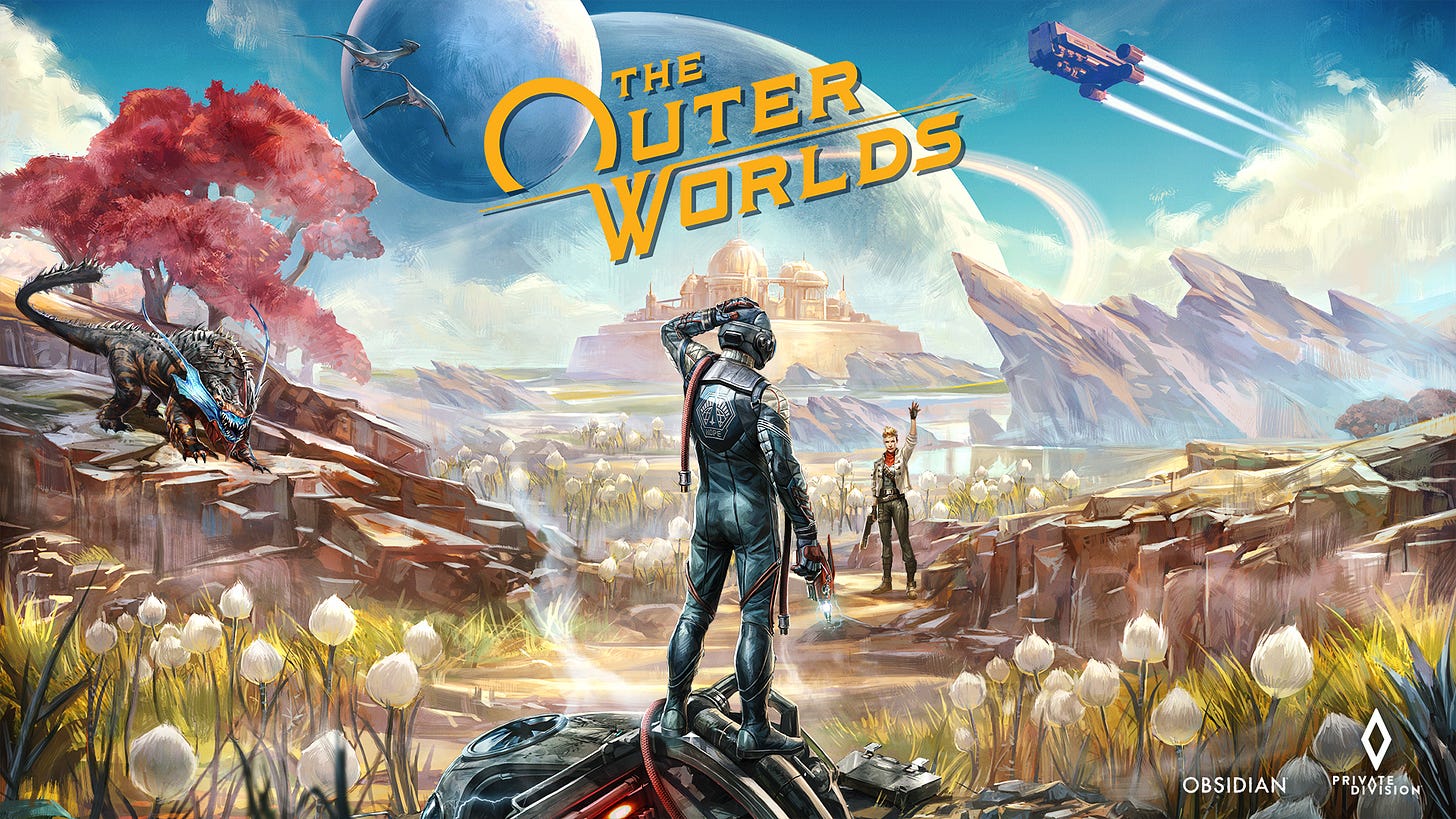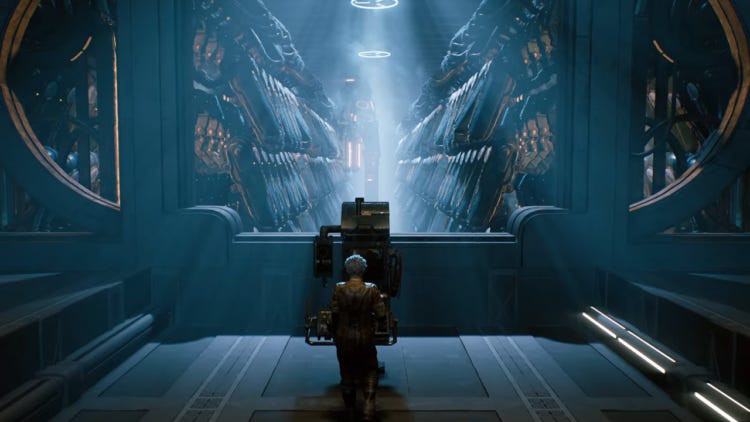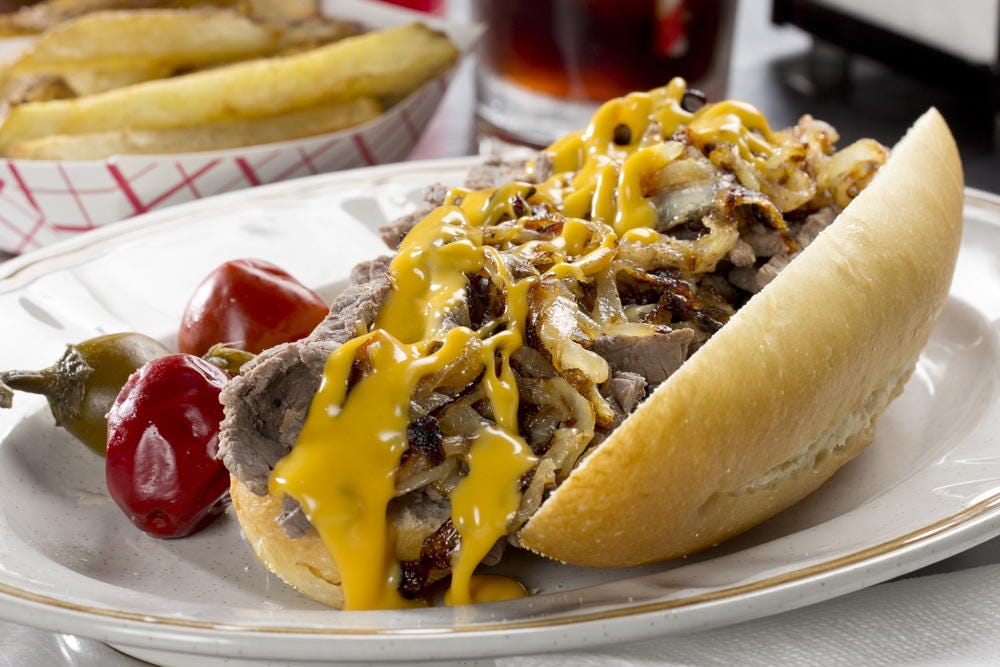The Outer Worlds Is An Imperfect Mutation Of New Vegas

The Outer Worlds is a game which very much wants you to remember that the blood of Fallout: New Vegas is pumping through its veins. The announcement trailer specifically namedrops New Vegas as the studio's pedigree, despite the fact that Obsidian has released 5 games since, including its own wholly original and wildly successful Pillars of Eternity, which went unmentioned. The game is rife with small stylistic touches that point back to modern Fallout, from the particular way that characters are framed during dialog sequences to the syntax for in-dialogue skill checks to the way the game sometimes slows time for a cinematic depiction of a final blow on an enemy crumpling them to the ground. Both explicitly and subtly, this game is screaming to you "I'm cut from the same cloth as New Vegas".
Being kin with New Vegas is a strong sell for me. It's absolutely one of my favorites, I've played it for hundreds of hours, and I actually have a New Vegas tattoo on my left arm. A game that follows up on that game's ideas was always going to be an instant buy from me, and now having put a bow on my 20-or-so hour playthrough of the game, my final opinion is something along the lines of "Uh, you kinda did it?"
Fallout: New Vegas is a hell of a game to tee off against. Considered by many (myself included) to be the best Fallout game, which is unto itself an extremely highly regarded series, New Vegas had some ideas that few games of its ilk since have ever dared to match. Extremely solid writing and open-ended quest design made for a world that made good on the "play how you want" promises of the RPG genre, making a game that would anticipate your attempts to break its structure and allow you the freedom to do so. Some extremely solid character progression mechanics let you really create a unique avatar, such that every playthrough of New Vegas genuinely feels different. The grand plot of the game was crafted from the ground up for open-world play, solving the dissonance between "save the world" narratives and meandering gameplay by describing a world that was locked in a stalemate until an agent of chaos (that is, you) knocked it loose.
Despite all of this, New Vegas absolutely still has issues, some of its own creation and some created retroactively by the modern landscape of gaming. The combat is fairly lackluster and has gotten worse with age, the characters all have that cold and lifeless "Bethesda face", and the color palette of the game consists mostly of shades of poop brown and concrete grey. Furthermore, while the game's strategic possibility space of kill-sneak-talk definitely allows for a wide range of player choice, as time progresses and more games implement the same options, New Vegas's implementation feels more and more stale.
Understanding New Vegas's successes and failures is, I think, critical to properly evaluating the success of The Outer Worlds, because The Outer Worlds actively wants you to think of it in the same space as New Vegas. All aspects of the game feel like they are either following New Vegas, or are differing specifically in response to New Vegas.

So here comes The Outer Worlds. Coming out almost a decade after New Vegas, under the same studio (I can't say how much of the actual New Vegas team still works at Obsidian, admittedly), we're taking another crack at the same general design ethos. This game represents an opportunity to grab New Vegas's best ideas, shave away its worst drawbacks, and evolve this style of open-world player driven game, a style of game whose modern progenitor isn't exactly hitting homers right now.
The Outer Worlds makes some fantastic steps forward for the genre. The greatest of these are the companions, who feel in many cases like the crew of Firefly as rendered through the mechanics and writing of Mass Effect. They're generally a set of interesting characters, who crucially provide insight into the setting, as well as have a lot of genuinely interesting banter with one another. The simple decision to let you have two human companions at a time (instead of New Vegas, which let you take one human companion with either a non-sentient robot or a dog) creates tons of space to explore the relationships of your crew.
Combat, while still probably not up to snuff for a lot of people, is definitely a step in the right direction. V.A.T.S has been replaced with a time slow-down ability which drains a meter of, I dunno, time juice, giving you those moments of quiet mid-combat to plan while still relying on your gunslinging ability instead of V.A.T.S making you roll the dice. A tactical dodge added to your core repertoire, along with what seems to be a decreased prevalence of hitscan weapons, makes movement feel much more important than in gunfights in the Mojave. Some streamlined companion commands, as well as very spammable companion abilities, provide crowd-control that I wish I would have had against some of New Vegas's threats (coughCazadorescough).
If there's a place where I can point to The Outer Worlds being lesser than New Vegas, it's in quest design. Almost every quest in the game entails going somewhere, shooting some guys (or sneaking past some guys or speech checking some guys), getting a thing, and taking it back to one of maybe several people back in town. There isn't a sense that you can really do quests any way you want. Instead, other than the kill-sneak-talk triumvirate for dealing with enemies, it seems that everyone's going to do every quest essentially the exact same way.
A lackluster character progression system doesn't help with this. Skills are leveled up in clusters of related skills instead of individually for their first 50 ranks, a system which definitely led to me becoming a jack-of-all-trades without any real specialties. While many of New Vegas's perks could be called on to open up new ways to play (such as Cannibal, which gave you a new source of health regen and opened up new dialogue options in certain quests), The Outer Worlds's perks are mostly bland statistical buffs, few of which even hit at new ways to handle the game's challenges. This compounds by rendering the game's flaw system, a super interesting idea wherein the game will offer you narrative-driven debuffs in exchange for perk points, irrelevant. As a result, your character ends up lacking anything resembling a unique feature.
Strangely adding to this is the game's loot. There are not that many weapons in the game, which opts to have you find enhanced versions of early-game guns and melee weapons as the game progresses instead of giving you wholly new weapons, meaning you'll be shooting the same assault rifle at hour 20 that you were shooting at hour 1. There's a very small set of equipment mods, most of which you'll have found before you left the first planet, which don't really help to make your loadout feel special. Ironically, this is a problem that Fallout 4, a game I otherwise don't like, solved with a crafting system that helped your guns feel genuinely unique. In this game, you end up feeling like an indistinct character, wielding a factory-default weapon, doing the same quests the same way as everyone else.
So my opinion of this game is sort of mixed. Steps forward in a lot of ways, including many I haven't the word count to bring up here (the art style is so much better). Steps backward in others, including many I still haven't the wordcount to bring up here (I found myself missing the Pip-Boy radio a lot).
Ultimately, when it comes to my opinion of the game, I have to talk about Philly cheesesteaks. It'll only take a second.

In my hometown (which is nowhere the fuck near Philadelphia, for the record), there are two Philly cheesesteak places literally across the street from each other. According to a story my dad told me that might be complete bullshit but serves as a fantastic metaphor, the owner of one of these restaurants is a former employee of the other, who quit either because he hated the owner, the owner hated him, or maybe both. He quit, opened up his own cheesesteak place across the street, and the two have been taking potshots at one another ever since. Apparently they have a penchant for keying each others' cars.
The funny thing is, the new cheesesteak place, the one started by the disgruntled ex-associate of the first cheesesteak place, unmistakably bears resemblance to the old place. They have literally the exact same menu. I don't mean both menus have the same items, I mean the new cheesesteak place appears to have taken the physical menu from the old place (legally, I hope), put black tape over any mention of the old place's name, and hung it up as their own menu.
Here's the thing: both restaurants? Damn good cheesesteak. I go to both. I definitely prefer the old place, but I'll go to the new one in a heartbeat. I still prefer both of them to half of the restaurants in this town, most of which are boring, flavorless corporate chains. I don't want to go to the old place forever, I want these places to grow and get better, and if the thing that motivates growth in the North Texas cheesesteak scene is pure, unfiltered spite? Then, sure, go for it.
Now, if you'll excuse me, I'm in the mood for cheesesteak.